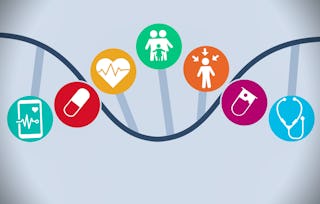Learn how advances in biomedicine hold the potential to revolutionize drug development, drug treatments, and disease prevention: where are we now, and what does the future hold? This course will present short primers in genetics and mechanisms underlying variability in drug responses. A series of case studies will be used to illustrate principles of how genetics are being brought to bear on refining diagnoses and on personalizing treatment in rare and common diseases. The ethical and operational issues around how to implement large scale genomic sequencing in clinical practice will be addressed.

Case Studies in Personalized Medicine

Case Studies in Personalized Medicine

Instructor: Dan Roden, M.D.
Access provided by Abu Dhabi National Oil Company
35,672 already enrolled
506 reviews
Skills you'll gain
Details to know

Add to your LinkedIn profile
See how employees at top companies are mastering in-demand skills

There are 6 modules in this course
The first module of this course will focus on introducing the concept of personalized medicine. We will very briefly review fundamentals of genetics as these apply to personalized medicine (DNA structure; RNA; protein structures; function of DNA; coding; DNA variations; types of genetic variants), as well as review statistical concepts and skills important to clinical data analysis (odds ratios, relative risk, P values, multiple testing, sensitivity, specificity, ROCs). In Module 2 we will explore drug actions and reactions as we look closely at the general mechanisms underlying variability in drug responses, drug metabolism and transport, and genetic variability in drug-handling molecules.
What's included
11 videos1 reading1 assignment5 discussion prompts
Module 3 focuses on how we study genetic variation. We'll start by looking at families and populations. Topics that will be introduced include family history and inheritance patterns, ancestry, and linkage. Then in Module 4 we shift our focus to studying the contemporary techniques and technologies used to study genetic variation, including genome-wide association and sequencing.
What's included
7 videos1 assignment4 discussion prompts
In Module 5 we will begin to discuss specific cases as these apply to personalized medicine. We will first look very closely at a case of familial hypercholesterolemia as we investigate how we use genomic medicine to move from a rare disease to a common medication, using genomics to find new drug targets, and a discussion of the side effects of statin therapy. In Module 6 we will look at a collection of "high risk pharmacogenetics"cases that illustrate adverse reactions due to drug metabolism and variable drug responses.
What's included
13 videos1 assignment4 discussion prompts
Module 7 continues our focus on case studies with a look at some cases that illustrate how personalized medicine informs treatment decisions related to specific diseases/conditions. These include cystic fibrosis, Marfan syndrome, heart failure, neuropsychiatric diseases, and diabetes. Three cases/lessons focus specifically on how genomic medicine informs testing for and treatment of cancer.
What's included
9 videos1 assignment4 discussion prompts
Module 8 serves as a review and a continuing discussion of the cases presented in Modules 5-7, as we take a look at where we are now and what's on the horizon in personalized medicine. In Module 9 we will explore some critical considerations for implementing and operationalizing personalized medicine in a system of care, particularly in the area of informatics. We will discuss the role of the electronic medical record in a learning healthcare system, how electronic records support discovery, and using electronic records in the delivery of personalized medicine.
What's included
9 videos1 assignment3 discussion prompts
We are on the verge of having patients come to their physicians with their entire genome sequenced. How can we best use this information to improve care? This course looks closely at many specific genetic variants that have been identified as playing a role in a person’s susceptibility to disease and/or potential for adverse reaction to certain substances/drugs. In the peer review activity below, please reflect on how your learning in this course has impacted your understanding of personalized medicine. There are two versions of this activity – one for healthcare professionals (doctors, nurses, pharmacists, medical students, etc.), and one for non-healthcare professionals (patients, consumers, general interest, etc.) Please be sure to choose the appropriate version of the activity.
What's included
2 peer reviews
Instructor

Offered by
Why people choose Coursera for their career

Felipe M.

Jennifer J.

Larry W.

Chaitanya A.
Learner reviews
- 5 stars
84.02%
- 4 stars
14.39%
- 3 stars
1.18%
- 2 stars
0.19%
- 1 star
0.19%
Showing 3 of 506
Reviewed on Nov 21, 2016
It was a great course and so much information. I would surely like to get more knowledge and insight of the topic discussed.
Reviewed on Feb 14, 2016
very informative course at advanced level and also taps the basics required to understand the advanced concepts wherever necessary.
Reviewed on Mar 21, 2021
The course offers interesting cases and fitting explanations. You will understand when to use genetics for personalising care.
Explore more from Health

University of Geneva

University of Copenhagen

The State University of New York

American Museum of Natural History
¹ Some assignments in this course are AI-graded. For these assignments, your data will be used in accordance with Coursera's Privacy Notice.

